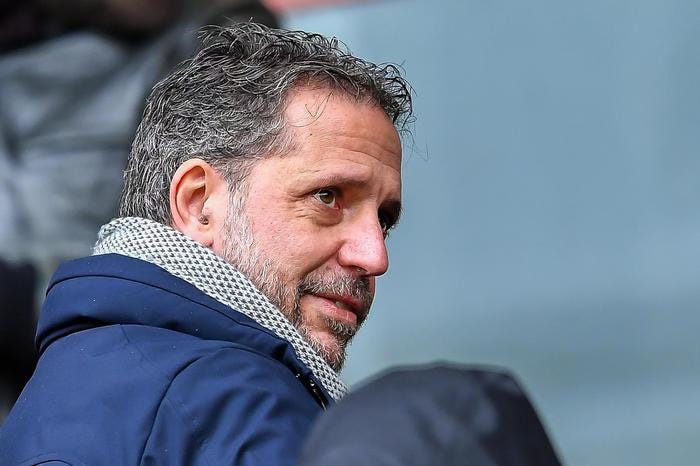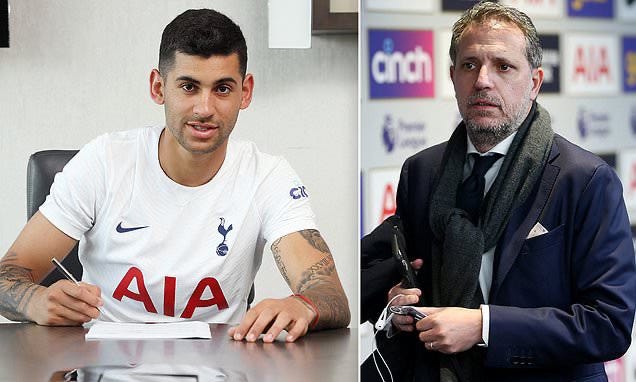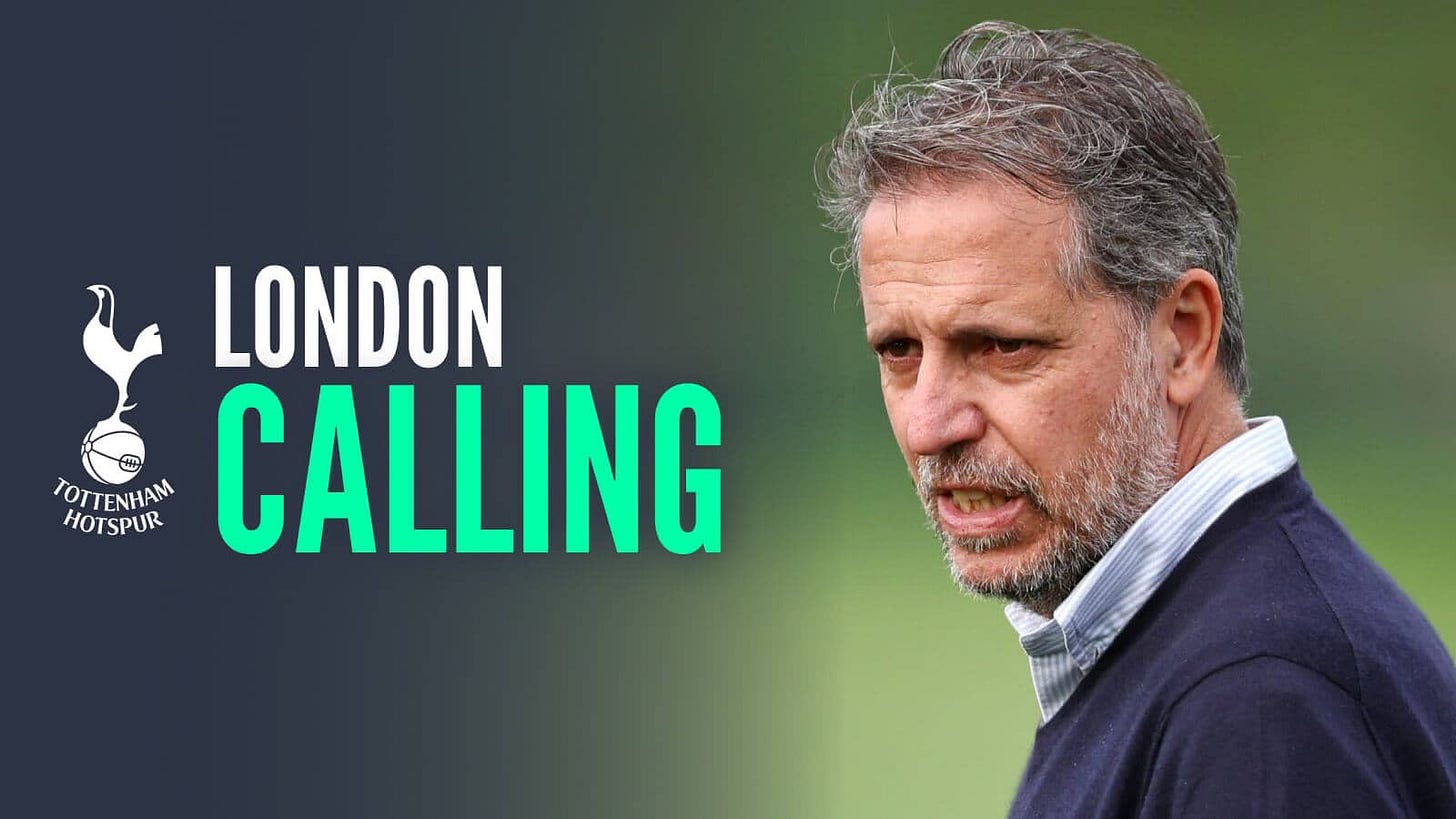When Paratici damaged Tottenham by making them buy Romero for 50 million to allow Juventus and Atalanta to settle mysterious debts between “friendly clubs”
The strange deal is recounted by investigators who intercept the Juventus d.s. in conversation with Percassi. When Paratici said: “I’m the one dealing for Atalanta, Genoa, and Sassuolo"
(Translated into english by Grok)
Not content with having turned the glorious A.C. Milan, at least at a corporate level, into a veritable Armata Brancaleone, the American ownership of the club, led by Red Bird and even more so by Elliott, is now managing to put the cherry on top of a spoiled cake with the latest move by CEO Giorgio Furlani, who seems intent on handing the reins of the club to Fabio Paratici. The former protégé of Andrea Agnelli, who moved to Tottenham, is currently banned for two and a half years—a sanction imposed on January 20, 2023—for irregularities committed at Juventus. He is also on trial in Rome in the criminal case that concluded the Prisma Investigation into the manipulated financial statements of the Bianconeri club. To understand who the future Milan mastermind is and what his past entails, today—following yesterday’s first installment—I am publishing a second excerpt about him from my book Juventopoli, published by Piemme in the summer of 2023.
*“(…) The truth is that Paratici, much like Moggi in his heyday (so to speak), began navigating the football world with the demeanor of a factory boss. The bans and fines he received for insulting referees at halftime when Juventus wasn’t winning, or at the end of matches when Juventus lost, are countless. And perhaps you didn’t know this, but Paratici, a true pioneer, earned a spot in the Guinness World Records as the first football executive in history to be banned for ‘insulting the VAR’ (sigh!).
In the documents of the Prisma Investigation, some of his intercepted conversations emerge as disturbing due to their implicit confessional content. In a phone call with Corrado, the general manager of Pisa, a Serie B club, Paratici expresses interest in the young striker Lucca, who is making a name for himself at the Tuscan club. Does he want to bring him to Juventus? Not at all. Paratici called his colleague to tell him straight up that even though Lucca is a Pisa player, he wants—and indeed must—handle the deal himself. ‘I’ve always done it,’ he explains to Corrado, ‘I did it with Caldara (an Atalanta player who ended up at Milan under his supervision, ed.), you have to let me handle the operation! Trust me, I’ll take care of it for Pisa too. You just give me the guidelines, and I’ll sort out the rest. I’ve done it for Genoa my whole life, I’ve done it for Atalanta my whole life, I’ve done it for Sassuolo my whole life… When I handled deals for Atalanta or Genoa, I wasn’t thinking about Juventus. I was thinking: Genoa needs to be okay… I give them a fixed fee, I give them a bonus that stays with Genoa, I give them a bonus when he gets to Juve—if all goes well, there’s plenty of money for everyone!’*
To sum up: Paratici, a Juventus executive since 2010, claims to have been ‘forever’ managing the transfer dealings of Genoa, Atalanta, Sassuolo, and who knows how many other clubs he’d add to the list if he weren’t in such a hurry to start running Pisa’s transfer market too. So much for the integrity of the leagues.
In another interception, we find him speaking with Tuttosport director Guido Vaciago, who informs him of a conversation he had in Paratici’s defense with Juventus’ head of communications, Claudio Albanese, regarding the controversial topic of fictitious capital gains—an exaggerated practice by Paratici and Juventus that was raising red flags left and right. Vaciago tells him he said: ‘It’s not like Paratici woke up one morning and said: today I feel like cooking up a nice capital gain! (…) At some point, you’d do the math, call him, and say: you need to make 100, you need to make 150, you need to make 70 (…) and then he’d deliver. And you should thank him for it, because that’s how you masked your problems for three years.’ To which Paratici replies: ‘Oh no, for six or seven! But fine. Maybe three, maybe three…’
In translation: after revealing himself as the Great Puppet Master of the transfer markets of Atalanta, Sassuolo, Genoa, and who knows how many other clubs, Paratici admits to resorting to the trick of fictitious capital gains not for three years—the period under investigation by CONSOB and the Turin Prosecutor’s Office—but for six or seven. Since he says this in the summer of 2021, going back seven years takes us to the 2014-15 season. You do the math on how many championships Juventus won in that span by relying on illicit fake capital gains on one hand and manipulating various ‘friendly clubs’ on the other—clubs willing to let Juventus, through Paratici, handle even their own transfer operations. It’s a bit like racing a team time trial with domestiques taking turns helping you, while your opponents ride an individual time trial. Who wouldn’t win?
But Paratici is a Superhero, Paratici is Paratix! And Paratix can dare the unthinkable—everything is allowed for him. Question: Can an executive paid by Club X act in the interests of his former Club Y and a third Club Z, to the detriment of Club X, which pays his salary? For example, by making Club X overpay wildly for a player to settle old debts between the ‘friendly’ Clubs Y and Z? What’s that you say? He can’t, and in fact, it would be grounds for dismissal with just cause? Well, in the wondrous world of Paratix, Juventus, and Juventus’ ‘galaxy of friendly clubs,’ all this is possible. Follow along.
Fabio Paratici, who was a Juventus executive during the nine consecutive championships won from 2012 to 2020, is now the managing director of Tottenham, one of the Premier League’s top clubs. In the summer of 2021, magistrates intercepted him negotiating the purchase of Romero—an Argentine defender Juventus had loaned to Atalanta for two years for 4 million, with a 16-million buyout clause due in 2023—for the English club. Paratici tells Luca Percassi, Atalanta’s CEO, that he’ll make Tottenham shell out a whopping 50 million for Romero (which indeed happens), but for that to occur, Atalanta must accelerate the payment schedule agreed with Juventus and buy Romero outright immediately, rather than in 2023, paying Juventus the 16 million right away. Juventus desperately needs liquidity and is in a dead-end situation, having come under CONSOB’s scrutiny.
‘Paratici,’ the magistrates write, ‘though acting on behalf of the London counterpart, states that this amount (50 million, ed.) is high compared to the player’s value and therefore urges the conclusion of a deal that is, in fact, highly advantageous for Atalanta since “you’ve got a player you’re paying 16 million for, and a day later you sell him for 50.”’ ‘On the other hand,’ the magistrates continue, ‘the Bergamo executive explains that for financial reasons (“I’d be exposing myself to a ton of money”), before greenlighting the operation, he needs to reach an agreement with Juventus both for Romero’s buyout and for the loan of Demiral.’
Question: Why does Luca Percassi, despite the chance to pocket 34 million (50 - 16) in a flash, make it so difficult? He does it because Atalanta has been owed unspecified favors by Juventus for years, from the Bianconeri’s long, victorious seasons. Indeed, the son of Atalanta’s president reiterates to Paratici ‘the need to meet Agnelli in person to also secure “Demiral on loan, and he discounts the loan against my credits—if he gives me Demiral on loan, that allows me to do the deal because it means selling Romero and getting a replacement for free.”’ At this, Paratici—who, let’s repeat, is a Tottenham employee here serving the interests of Juventus and Atalanta while pulling a fast one on Tottenham—reassures Percassi: ‘Andrea,’ he says, referring to Agnelli, ‘is someone who’ll sort it out later… because they’re doing the recapitalization… what he mustn’t do now is make it look like he’s throwing money away, okay? … So, we had to sell Romero even if it wasn’t at the right price, sell him, and thus self-finance…’
Final question: What are these credits that Atalanta—13 losses and 5 draws against Juventus in the nine championships won by the Bianconeri, a record so bad that even Pizzighettone would’ve done better—claims from Agnelli’s club? It’s really hard to say. The only certainty is that at the Royal House, this issue troubles everyone, so much so that Cherubini, intercepted speaking with Paratici, says he reminded Agnelli that ‘we’re at fault in some situations, we’re negotiating Demiral with various clubs for 30-35 million, but if Atalanta comes, we have to do it at different figures that allow them to sell Romero—maybe we’ll lose a few potential million from the buyout, but you resolve something.’ Indeed, Agnelli and Percassi call each other and set a meeting for August 2. Agnelli explains to Percassi that ‘right now, I have to stay put because we’ve got CONSOB, the Guardia di Finanza, and everything else watching us… over the last two years. So, I’d like to close this thing and then get back to sorting out, fully aware of what we owe, the various situations.’
The meeting happens, and the deal is struck: Juventus sells Demiral to Atalanta at a discount; he replaces Romero, whom Atalanta buys early from Juventus for 16 million and then sells to Tottenham’s unsuspecting president Daniel Levy for 50 million (!).
This operation, too, was conducted, according to the investigators, with ‘elements of opacity (…) due to the need to present it as a loan with an option to buy from Tottenham (thus uncertain and not subject to mandatory registration in the 2021 financial year) rather than an obligation… to avoid its full taxation.’ Leveraging his experience from Juventus, Paratici arranges for Tottenham to provide a private agreement, or ‘side-letter,’ as a guarantee for the 50-million payment, which he personally delivers to Percassi ‘and which, if used to enforce compliance, would expose the false accounting of the Bergamo club.’ ‘I can never pull out that letter,’ Percassi complains to Paratici, ‘because if we end up in court, it’ll come out that I falsified the accounts.’ Irregularity upon irregularity, in short, which has become Paratici’s standard modus operandi and no longer surprises the magistrates: ‘The presence of unpublished side-letters,’ they write, ‘is a recurring method in Paratici’s operations, dating back to when he led the sporting department at Juventus FC.’
In one final call, Percassi informs Paratici that Agnelli demanded nothing for the agreed loan payment: being in debt, he offsets part of it this way, Paratici remarks. And here we are again: the mysterious debt Juventus owes Atalanta. A debt not recorded in the financial statements but lingering for years. Whether it’s financial or ‘out of gratitude,’ no one knows. In a clean football world, free of shadows, such a debt should never exist. But in Italy’s Serie A, the league of ‘branch offices,’ it seems right at home. Not just between Juventus and Atalanta.’ (…)”











